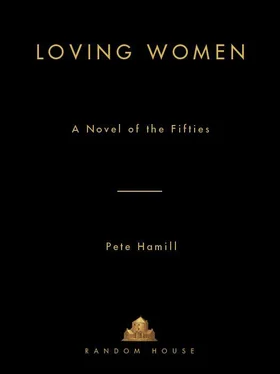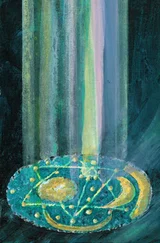But I had to get out of there. The rain was blowing hard and cold. A shower of hailstones clattered across the square. And yet I felt as if I were being boiled. I shivered. I thought I was going to throw up. Another bolt of lightning split the sky over the river. My eyes burned.
I had to go.
To run.
To get into the room and the bed.
I broke out of the dense packed crowd and ran into the pelting rain, the water above my ankles.
And then the water rose and the sidewalk came with it and hit me in the face and I was gone.
The fog was the color of piss and it came through the window and under the door of the high white room. Miles Rayfield stood in the cloud, wearing his white hat and his horn-rimmed glasses, his lips a bright red smear. And behind him came all the others: Sal and Max and Winnie, Buster and the Red Shadow, Captain Pritchett and Steve Canyon. As someone shouted: Everyone meet at the Café of the World!
O Bobby Bolden!
O Buz Sawyer!
I remember them all, from that visit to the fever zone: Dwight Eisenhower was there, and Mercado from Mexico. Hank Williams entered with John Foster Dulles, and there was Tons of Fun … and Dixie Shafer too. They came in a smiling progression, looking down at me sadly and without pity. Roberta arrived holding blue-veined white flowers. Turner showed up in a Hawaiian shirt. And that was Chief McDaid and this was Tintoretto … Freddie Harada held hands with Harrelson … and there, advancing and receding, smiling and frowning, touching my face and then wide-eyed in fear: Eden Santana.
Did she whisper to me about Joe Stalin? Did she urge me to read Ernest Hemingway? In the piss-colored fog, there was no precision. Boswell wept for Hank Williams while Eden touched my hand and then released it. I tried to rise … to join her … to dance … but my legs wouldn’t move. My hands were thick tubes. My father wept for my mother. Miles Rayfield waved in the fog. Then Eden came close and spoke to me softly in some language I didn’t know. The language of The People. The language of the Cane River. The language of Africa. I turned away, trying to conjure a cool green world, plunging deeper and deeper, going for the fresh water, past the gnawed bodies and the sharks, down into the whiteness …
And then opened my eyes.
Eden Santana was standing at the foot of the bed, staring at me. Her hair was brushed back. She was wearing a black blouse and a white skirt. Her eyes were glittery, intense.
“Hello, Michael,” she whispered.
“Eden …”
She came around to the side of the bed and took one of my hands in both of hers. Her hands were very cool.
“You’ve got malaria,” she said.
“Malaria?”
I looked at the room, its whiteness and emptiness. Saw a chair, a bureau, a night table.
“Where is this?”
“Charity Hospital. They brought you here two days ago. You collapsed on Chartres Street in the middle of a thunderstorm.”
“Two days ago?”
“That’s what the nurses tell me.”
Two days ago?
“How’d you know I was here?”
“Father Bienville came to my sister’s house. That’s where I’m stayin. He told me you were in New Orleans. You gave him the name of your hotel, remember? I went there and they said you hadn’t been in. And you owed a day’s rent. I paid it and got your stuff.”
She nodded at my flight bag, on the floor against the wall.
“Then I started calling around.”
“You call the police?”
She blinked. “No. And I didn’t call the Navy either — if that’s what you’re worried about.”
I squeezed her hand. And whispered: “I’ve got to get out of here, Eden. I’m in big trouble.”
“I know,” she said.
The doctor was from Honduras and he wasn’t happy about letting me leave the hospital. But I told him I was in the Air Force and would go right to my base doctor and tell him what was wrong. He gave me some tablets to take every four hours and then I got dressed and Eden led me down the white corridor past the white nurses and the white rooms filled with white people. I felt very light. As if I could fly. And then stopped when we reached the elevator bank. Eden squeezed my hand, as if trying to keep me from running.
Red Cannon was sitting in a chair beside the elevators, smoking a cigarette. He was wearing his dress whites with an SP armband. There was a.45 caliber pistol in a holster hanging off his cartridge belt. He put out the cigarette in a metal ashtray and stood up. He looked from me to Eden. Then back to me.
“You okay, sailor?” he said, his voice quiet, even soft.
“I guess.… It’s malaria.”
“Well, they got a lot of experience with that over at Mainside.”
I looked at Eden but she kept her eyes on the floor.
“I don’t want to go back, Red.”
“Neither do I. But we’re both goin.”
“What if I refuse?” I said. “What if I just run?”
“Then I have to shoot you.”
“You aren’t kidding, are you?”
“Hit’s my job. I’d ruther bring you back walkin than bring you back in a box. But I promised Captain Pritchett I’d find you and bring you back. I did, and I will. So we can go now, sailor, nice and quiet.”
Eden stepped between us and for a moment, Red bristled, as if afraid she was trying to help me escape. There were a lot of people looking at us now. Patients and doctors and nurses.
“Can we talk about this downstairs, Mister Cannon?” she said quietly.
“Suits me.”
We went down in the elevator and out through the main lobby to the parking lot. A gray U.S. Navy car was parked near the entrance. It was empty, so I was certain that Red had come alone. I looked out at the streets beyond the lot.
“Don’t even think about runnin, sailor,” Red said.
I shrugged, and stared at the ground, feeling small and trapped and vaguely ashamed. I’d made a mess of things. Eden put her arm around my back. When I looked up, Red was lighting a cigarette and staring at some giant magnolias beyond the lot.
“Tell you what,” he said, still not looking at me. “I’ll give you till tomorrow morning. Sunday. Ten o’clock. You meet me in Jackson Square, right at the foot of that statue of Jackson, you hear me? We’ll go back together …”
Then he looked at me, took a drag, let the smoke leak from his mouth, and said: “If you don’t show, I’ll hunt you down and kill you.”
Eden had seventy dollars and I had thirty-five, an immense fortune; we pooled the money and checked into the Royal Orleans Hotel. She handled everything. She registered us and paid cash in advance and led us across the hushed lobby under the crystal chandeliers to the elevators. All the while, she acted as if she were escorting a prince instead of a malarial AWOL sailor in filthy clothes. At the door of room 401, she slid the key into the lock and looked at me in an odd way and then opened the door and waved me in first.
The room was large and dim with a huge double bed and French doors leading to a small balcony. She turned on one muted light and then pulled down a corner of the bed coverings. On the walls, there were dark-brown landscapes in gilt frames and whorling velvet wallpaper out of another century. Then she took my face in her cool hands and kissed me gently. I held her tightly for a long time, trying not to cry, and then we fell together to the bed: everything in me entering her, midnight bus rides, beaches, nights at the shrimp place, the trailer, the woods; again we were on the flat rock in the middle of a nameless stream, the water Alabama red and flowing around us; again we were in the time before she taught me the names of birds and trees, animals and clouds; we were among thorns, smoke, vines, sand, petals, stones, clay, in blood too and kisses and magnolia and fear.
Читать дальше












